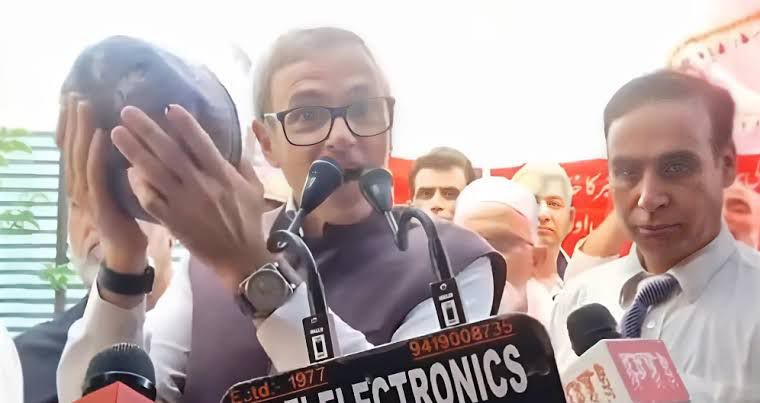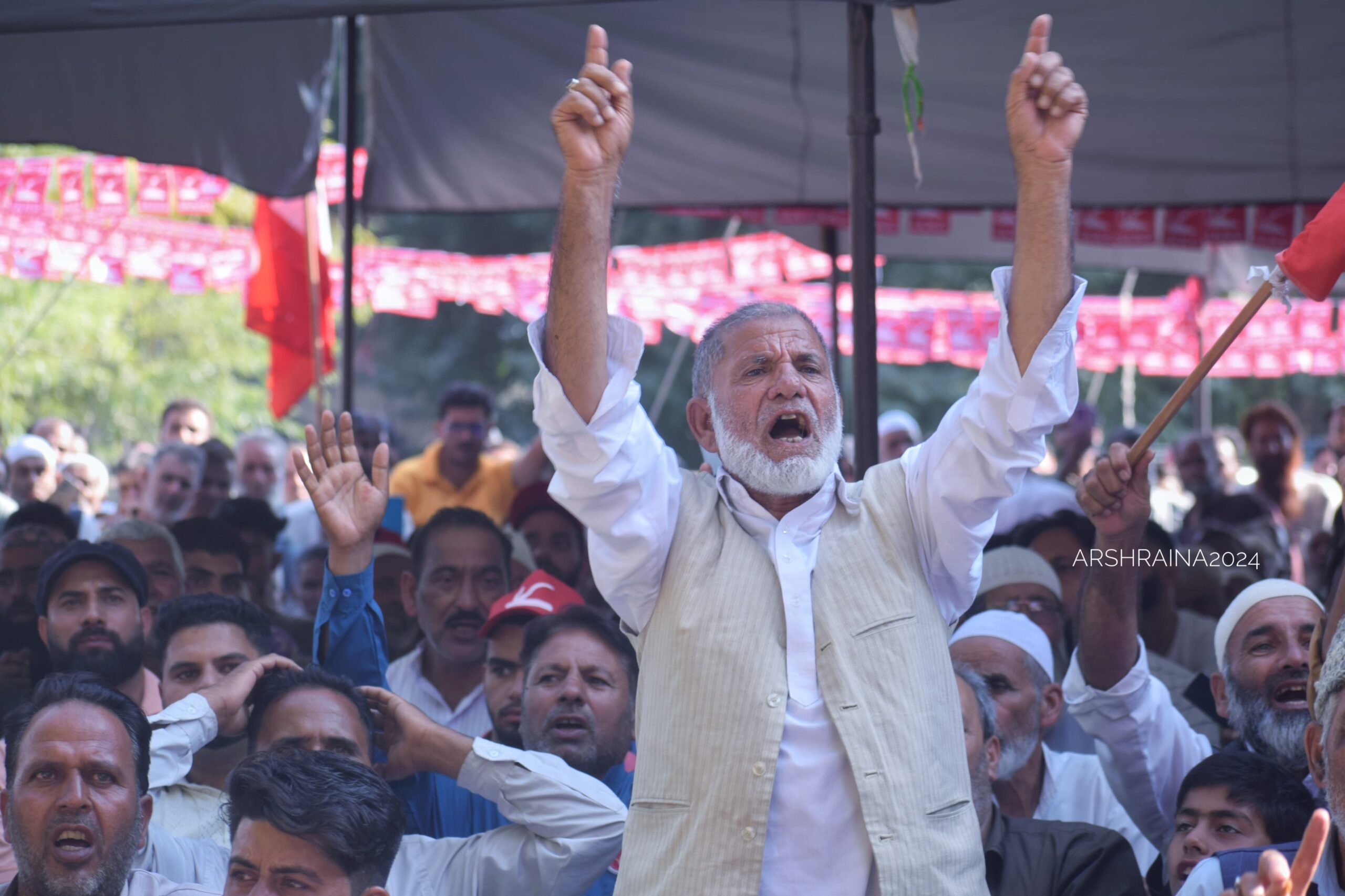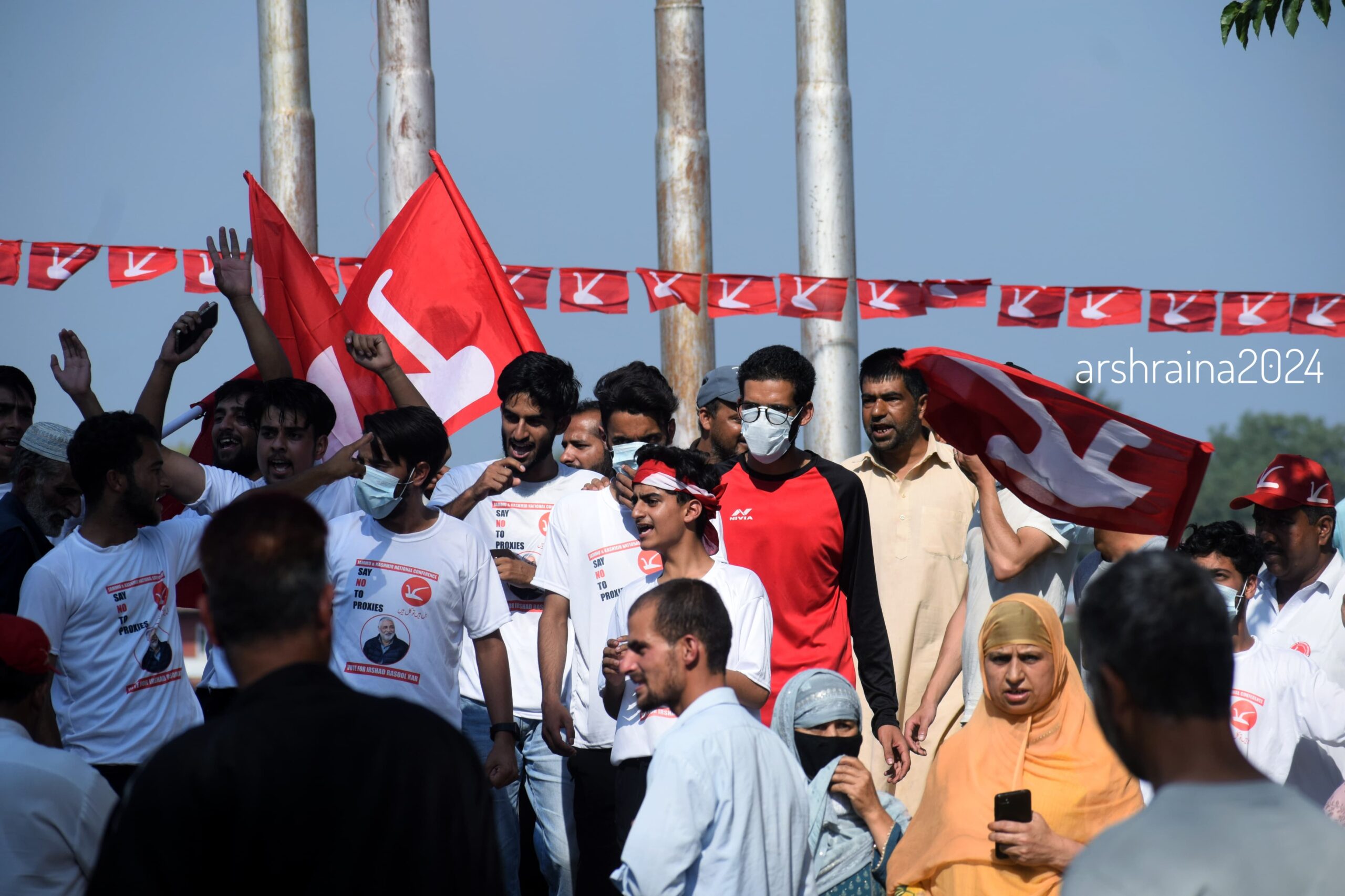Under Pressure: Omar Abdullah’s Hat-Trick in a Changing Kashmir Political Landscape

Mohammad Aatif Ammad Kanth, TwoCircles.net
On September 4, around 2:00 p.m., the National Conference office in Ganderbal reverberated with ‘Zyoon Hoo Zyoon Hoo, Nationalan Zyoon Hoo (we won, we won, National Conference won)’ slogans as Omar Abdullah, the party’s vice president and former chief minister of the erstwhile Jammu and Kashmir state, arrived there after filing his nomination papers. Accompanied by his political workers, he took to the stage to deliver a speech.
As the crowd listened intently, Omar removed his topi (skullcap) with both hands and said in broken Kashmiri, “Muen dastar, muen yi toop, muen yi izzat chu tuhindan athan manz, menis yath dastaras kerziv reach (My skullcap, my turban and my honour are in your hands, please protect them).”
The crowd erupted in slogans again, and an elderly man in his sixties, wiping away tears, shouted, “Lagha ath Abdullah khandanas (I wish I could die for the Abdullah family).”
In Kashmir, when someone removes their skullcap and put it in front of another, it signifies deep desperation, an urgent plea and a sense of helplessness. This gesture shows that the person is in dire need and is humbly asking for something from the one before whom they have placed their skullcap. But what compelled Omar to do so?
Nayeema Mehjoor, a senior journalist with over two decades of experience covering Kashmir politics, believes that Omar has become acutely aware of the growing public resentment against him and other major regional political parties. She notes that the shock of his parliamentary election defeat, something he never anticipated as a prominent political figure and former chief minister, has deeply affected him.
[caption id="attachment_450494" align="aligncenter" width="2560"] An elderly supporter of the National Conference chants slogans in favor of Omar Abdullah as he delivers a speech during an election campaign in Baramulla. Photo: Arsh Raina[/caption]
An elderly supporter of the National Conference chants slogans in favor of Omar Abdullah as he delivers a speech during an election campaign in Baramulla. Photo: Arsh Raina[/caption]
Omar, coming from a political dynasty accustomed to power, is now grappling with the emotional strain of losing the people’s support, leaving him feeling desperate and disillusioned.
“Omar never expected the parliamentary defeat,” Nayeema said. “As a scion of a major political party, it came as a shock. The resentment he feels towards him and his party, combined with the emotional drain of losing public favour, is evident in his actions — he had to remove his skullcap and plead with the people to return.”
Abdullahs have been synonymous with Kashmir politics since the 20th century, much like the Bhuttos in Pakistan and the Gandhis in India. Since the 1950s, members of the Abdullah family have either captured the hearts of Kashmiris or ruled the region without compassion. Sheikh Abdullah, the first elected prime minister of Jammu and Kashmir, became a household name in the 1930s and 1940s for leading the movement against the Dogra rule.
Until his death, most Kashmiris trusted his words without question, such was his influence. His political legacy passed to his son, Farooq Abdullah, and then to his grandson, Omar Abdullah, both former chief ministers of the erstwhile state.
Despite Omar’s popularity and influence in J&K politics, the act of removing his skullcap during a public speech seems symbolic, reflecting the pressure he faces. The growing challenge from politicians like Engineer Rashid, who is turning empty stadiums into packed audiences, particularly in the northern and central parts of the Valley, is unsettling the Abdullah family’s once unchallenged dominance.
Candidates backed by Rashid are posing significant challenges to senior politicians like Omar and Sajad Lone. Upon his release from jail, MP and Awami Ittehad Party chief Engineer Rashid immediately targeted Omar, vowing to “defeat him on his own turf”. Rashid has fielded Sheikh Ashiq, a well-known businessman and former head of the Kashmir Chamber of Commerce and Industries (KCCI), to run against Abdullah. Ashiq, a local with considerable influence, has actively campaigned among urban voters in the constituency.
Political analysts suggest that the public is frustrated with major politicians who, after their release from jail following the abrogation of Article 370, remained largely silent on the issue.
In contrast, Rashid openly spoke for the people of Kashmir and sharply criticised the current regime in Delhi, which earned him sympathy and support from those who now view him as their true representative.
[caption id="attachment_450493" align="aligncenter" width="2560"] National conference supporters during an election rally in Baramulla. Photo: Arsh Raina[/caption]
National conference supporters during an election rally in Baramulla. Photo: Arsh Raina[/caption]
Javaid Bhat, 45, a resident of Ganderbal, shared his thoughts, saying, “We have been loyal supporters of the NC for generations, but things have changed. We have backed Omar Abdullah and his party in every election, but after the abrogation of Article 370 and the hardships Kashmir has faced in the past five years, he has remained silent. In contrast, Rashid not only spent five years in jail but has consistently spoken up for us throughout his life. We will support any candidate he endorses. It is time for these big politicians to learn a lesson in this election.”
The day after pleading to the people in Ganderbal, Omar travelled to Budgam to file his nomination papers, this time joined by Agha Ruhullah Mehndi, an MP from Srinagar. Unlike in Ganderbal, Omar was not wearing a cap in Budgam. Mehndi addressed the challenges the NC was facing and announced that once Omar became chief minister, the assembly would overturn all post-August 5, 2019, decisions and release detainees. As he concluded, the crowd began chanting ‘Zyoon Hoo, Zyoon Hoo’ and Omar, signalling for calm, waved and thanked them.
In Budgam, Omar holds an advantage. With the help of MP Mehdi, a Shia cleric, the NC has successfully reactivated its silent supporters during the Lok Sabha elections and has the numbers in its favour. In addition, with 20-25% of the constituency’s voters being Shia, the party is working to ensure a majority of Shia votes support Omar.
However, Omar faces strong competition from PDP’s Syed Muntazir Mehdi, also from a family of clerics and a cousin of Ruhullah. Both families are highly respected among Shias and remain influential figures in the region.
Mehjoor remarks, “I believe the smartest move the NC has made so far is bringing Mehdi to the forefront. He is an outspoken politician with a strong reputation, especially among young voters. If the NC is to make a dominant comeback, he will be key to that. I think Omar’s edge in Budgam is largely due to Mehdi’s influence; otherwise, he would have faced significant challenges in Budgam as well.”
Despite Omar, his party workers and the NC candidates attracting decent crowds, significant challenges persist. One major obstacle is the recently released Engineer Rashid, who has gained widespread sympathy. Many people resonate with his struggles over the past five years and feel a strong connection to him.
While support for Rashid and his independent candidates was somewhat limited in the first phase in South Kashmir, the real challenge lies in North Kashmir, his stronghold. As Omar and his team move into his territory, it remains to be seen whether Omar’s gestures, like removing his skullcap, have made a lasting impact or if the public has decided to push big political figures out of Kashmir’s political landscape.
Shahid Nazir, 24, a supporter of Rashid, expressed his frustration with the major regional political parties: “We will show the NC, the PDP and others that if they don’t care about us, we know how to take revenge by electing Engineer Rashid’s candidates. These big politicians need to understand the power the public holds.”
“If the AIP candidates don’t win this time, it will be a collective defeat for all of Kashmir,” he added.
